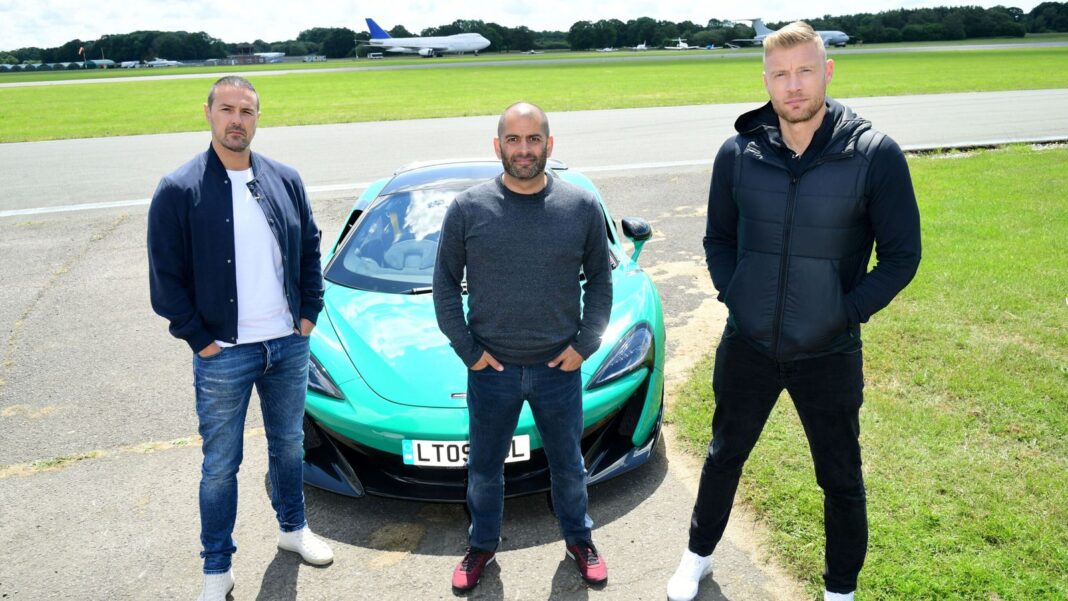A former Top Gear presenter has revealed he raised safety concerns with the BBC before Andrew “Freddie” Flintoff was seriously injured in a crash and warned someone could be killed.
Breaking his silence, Chris Harris said he “saw this coming”, but said the corporation failed to take him seriously.
TV presenter and former England cricketer Flintoff, 46, was badly hurt in an accident at the Top Gear test track Dunsfold Aerodrome in December 2022, which led to the show being pulled for the “foreseeable future”.
Last year, the BBC said it had agreed a financial settlement Flintoff, reported to be worth £9m.

Flintoff was seriously hurt in the 2022 crash. Pic: BBC
Recalling the crash on the podcast the Joe Rogan Experience, Harris, 49, said: “I ran to the window, looked out, and he wasn’t moving.
“So I thought he was dead. I assumed he was, then he moved.”
He added: “The bit that I find really difficult is that in the aftermath of that accident the show was put on hold.
“Andrew had to recover from frankly awful injuries, and has done so – profound injuries.
“We all kept quiet. We said nothing, and I said nothing because I wanted to look after him. It wasn’t my story was it?
“I was caught up in the collateral damage.
“I lost my job immediately because they cancelled the show when my contract was up, so suddenly I haven’t got a job.”

The former cricketer’s injuries were still visible months after the accident. Pic: Reuters
He added: “And I just sort of got my head down. But I had seen this coming.
“There was a big inquiry, a lot of soul searching. The BBC is good at that.
“But what was never spoken about was that three months before the accident, I’d gone to the BBC and said, ‘Unless you change something, someone’s going to die on this show.’
“So I went to them, I went to the BBC, and I told them my concerns from what I’d seen as the most experienced driver on the show by a mile.
“I said, ‘If we carry on, at the very least, we’re going to have a serious injury, the very worst we have a fatality.'”
Read more:
Flintoff reveals extent of injuries after Top Gear crash
Top Gear star ‘struggled with flashbacks’ after crash
Harris also said he had asked to have a meeting with the head of health and safety.
He added: “What’s really killed me is that no one’s ever really acknowledged the fact that I called it beforehand.”
He went on: “I thought I’d done the right thing. I’m not very good at that. I normally just go with the flow, but I saw this coming.
“I thought I did the right thing. I went to the BBC and I found out really that no one had taken me very seriously.”
Previous Top Gear crashes
The accident was not the first faced by Flintoff during his time on the show. It followed a minor incident in February 2019 when he crashed into a market stall in Mansfield, Nottinghamshire.

Former presenter Richard Hammond was also seriously injured in a crash in 2006. Pic: Reuters
And in 2006, former presenter Richard Hammond was filming for the show when he crashed a jet-powered dragster called Vampire at nearly 320mph (515kph).
The presenter spent two weeks in a coma following the incident, which took place at the former RAF Elvington airbase near York.
He recovered and returned to the show in early 2007, but revealed in February this year that he fears he has memory loss as a result.

Keep up with all the latest news from the UK and around the world by following Sky News
Former Take Me Out host Paddy McGuinness and Flintoff joined motoring journalist and racing driver Harris on the show in 2019, taking over from Chris Evans and Friends star Matt LeBlanc.
The show was initially launched in 1977, featuring a range of presenters and reporters in a half-hourly slot on BBC Two which proved popular throughout the 1980s and 1990s.
But its relaunch in 2002 as an hour-long entertainment motoring show, led by Jeremy Clarkson, Hammond and James May, turned it into a worldwide hit.
The BBC declined to comment on Harris’s claims and referred to a previous statement by BBC Studios.
This said a health and safety production review of Top Gear, which did not cover the accident but instead looked at previous seasons, found that “while BBC Studios had complied with the required BBC policies and industry best practice in making the show, there were important learnings which would need to be rigorously applied to future Top Gear UK productions”.
It added: “The report included a number of recommendations to improve approaches to safety as Top Gear is a complex programme-making environment routinely navigating tight filming schedules and ambitious editorial expectations – challenges often experienced by long-running shows with an established on and off-screen team.
“Learnings included a detailed action plan involving changes in the ways of working, such as increased clarity on roles and responsibilities and better communication between teams for any future Top Gear production.”







